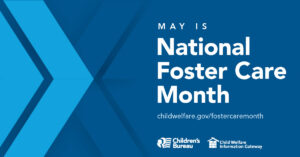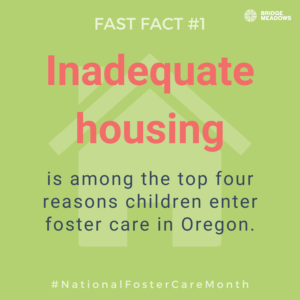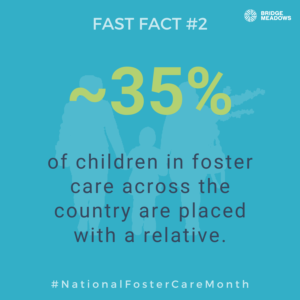National Foster Care Month
National Foster Care Month
Bridge Meadows was created to help children and families impacted by foster care thrive through intergenerational relationships, wraparound services, and stable housing. May is National Foster Care Month, and this year’s theme is “Engaging Youth. Building Supports. Strengthening Opportunities.” Join us in raising awareness about foster care and the importance of holistic care for kids and families this May.

Fast Facts
Did you know?
We want to equip you with the tools you need to be a true champion for families and the Bridge Meadows mission. Together, we can create a world where every child has a family, every parent is given the resources to thrive, and every generation is cherished.
Housing As A Foundation for Healing

The housing crisis our region faces creates instability and reinforces cycles of poverty for families, and children often pay the price. In Oregon, inadequate housing is the 4th most common reason children and youth enter foster care in our state. Inadequate housing includes homes that are unsafe, unaffordable, have moderate to severe structural problems, or are otherwise unsuitable for habitation.
According to the Oregon Department of Human Services’ 2022 Child Welfare Data Book, 13.8% of all children and youth (or 318) who entered foster care did so due to inadequate housing. That’s why Bridge Meadows starts with stable, quality, affordable homes as the foundation for healing.
Laura’s story perfectly captures the power of safe, intergenerational housing. She tells us that one of the best things about living at Bridge Meadows is that her children get their own room, giving each an opportunity to express themselves and have a sense of privacy and security.
Honoring Culture and Community
 Did you know that many adoptive parents and legal guardians of foster children are relatives or kin? According to the Administration for Children and Family’s 2020 report on Recommendations for Improving Permanency and Well-Being, maintaining kin relationships where possible is vital to the healthy development of children and youth. Grandparents, aunts, uncles, and kin relations create continuity for children, honoring their connections to family, culture, and community. To ensure healthy outcomes for all, these families need support and resources.
Did you know that many adoptive parents and legal guardians of foster children are relatives or kin? According to the Administration for Children and Family’s 2020 report on Recommendations for Improving Permanency and Well-Being, maintaining kin relationships where possible is vital to the healthy development of children and youth. Grandparents, aunts, uncles, and kin relations create continuity for children, honoring their connections to family, culture, and community. To ensure healthy outcomes for all, these families need support and resources.
More than 70% of the families at Bridge Meadows are kinship relations.
Jackie Lynn knows the power of kinship relationships. When her niece was unable to care for her own children, Jackie stepped in to help and found Bridge Meadows. After ten years of living in community, they’ve grown, they’re thriving, they’re stable.
Every Child Needs A Champion
 Children who have experienced instability and trauma can thrive when the right conditions, called protective factors, are in place. Research shows that when a child or youth has at least one devoted champion, like a teacher, mentor, or neighbor, they are more likely to be resilient and access the resources necessary to thrive.
Children who have experienced instability and trauma can thrive when the right conditions, called protective factors, are in place. Research shows that when a child or youth has at least one devoted champion, like a teacher, mentor, or neighbor, they are more likely to be resilient and access the resources necessary to thrive.
“Every child deserves a champion – an adult who will never give up on them, who understands the power of connection, and insists that they become the best that they can possibly be.” – Rita F. Pierson
Bridge Meadows builds a network of adult caregivers around children in the form of elders who serve as mentors and surrogate grandparents, championing them as they walk through life.
For Mark, living at Bridge Meadows is like living with an enormous family that looks out for each other. Each relationship he builds, each connection he makes, is another champion in his life. “Coming home to this is just amazing.”
More Key Facts & Statistics
To learn more about foster care, best practices for supporting children and families, and ways to get involved, visit ChildWelfare.gov/FosterCareMonth/.
Read, Watch, Listen
Get Involved & Commit to Supporting Children & Families
Sometimes it can feel overwhelming to know how to best help address this challenge. The first step is to understand the complexity of foster care and why families are being torn apart. We have provided a short list of recommended things to read, watch, and listen to. We hope this inspires your desire to effect change and have meaningful conversations.
READ
- Tip Sheet on Responding to Youth and Young Adult Mental Health Needs, Child Welfare Information Gateway
- Eight Youth-Centered Principles for Child Welfare and Juvenile Justice, The Annie E. Casey Foundation
- I Was Raised By My Grandparents, And We Could Have Used A Community Like Bridge Meadows, Scary Mommy blog
- A Proclamation on National Foster Care Month 2024, The White House
- Child Welfare Information Gateway
- A Kids Books About Foster Families, A Kids Co. About
- Bridge Meadows: A Case for Intergenerational Housing, American Society on Aging
WATCH
- Interview with Executive Director Dr. Derenda Schubert on Hello Rose City
- Building Better Childhoods
- Bridge Meadows’ YouTube Channel
- Why every student deserves a champion, Rita Pierson TED Talk
- Believe in Wonder documentary short film
LISTEN
- Learn more about visionaries who are re-envisioning foster care in America on the INNOVATE! Podcast on Spotify.
- 18 can mean an abrupt exit from foster care. For some, it’s no longer a solo journey, NPR Oregon Public Broadcasting
- Preventing Families from Having Child Welfare Involvement, The Annie E. Casey Foundation
- The Foster Points Podcast, Oregon Department of Human Services Child Welfare Program
Donate
Give Today
Bridge Meadows uses the power of intergenerational housing and relationships where not only children and youth thrive, but their caregivers, too. We know that a community of care creates a robust safety net for young people, ensuring that they are given the tools they need to successfully transition into adulthood. This work can’t continue without your support.
Donate
